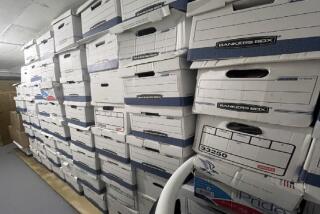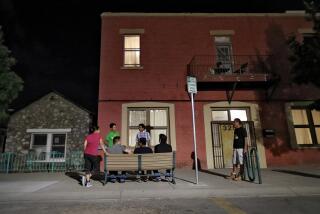Judge Grants Noriega’s Lawyers Access to Classified Documents
MIAMI — A federal judge ordered the government Wednesday to turn over classified documents at the heart of Manuel A. Noriega’s efforts to show that he worked with U.S. intelligence agencies in Central American drug deals.
The sealed ruling resulted from a week of closed hearings last month attended by prosecutors, defense lawyers and attorneys for the CIA and the State Department.
“It is now not going to be what the government wanted it to be--a garden-variety, run-of-the-mill drug case,” defense attorney Frank A. Rubino said after reading U.S. District Judge William M. Hoeveler’s 41-page opinion.
“It’s going to be in the context of what was really happening in Central and South America . . . involving the intelligence communities,” he said.
Diane Cossin, spokeswoman for the U.S. attorney’s office, said she would not comment on the ruling.
“We will abide by any order Judge Hoeveler issues in this case,” she said.
After more than 18 months of delays, Noriega is scheduled to go to trial Sept. 3 in Miami on drug trafficking and conspiracy charges.
A source knowledgeable about the ruling who spoke on the condition of anonymity said Hoeveler agreed that the following issues were relevant:
--Documents regarding CIA, Drug Enforcement Administration and other agencies’ operations allowing safe passage to drug planes in Panama, Costa Rica and Nicaragua.
--Panama’s involvement in the training of U.S.-backed Contras in Nicaragua.
--Operation Tipped Kettle, the effort by former National Security Council aide Oliver L. North to collect weapons in the Mideast and deliver them to the Contras.
--U.S. intelligence agency payments to Noriega.
The judge refused to grant the defense access to documents showing whether intelligence agencies used military bases to store drugs bound for the United States, the source said.
Meanwhile, the Washington Post reported in today’s editions that a key witness against Noriega recently left Florida for Colombia after being recruited by the U.S. Customs Service to work there as an undercover informer, without the knowledge of the Justice Department.
Federal prosecutors and Drug Enforcement Administration agents are now concerned that the witness, convicted drug smuggler Boris Olarte Morales, may not return to the United States in time for the trial, sources told the Post.
The sources described the matter as a “screw-up between DEA and Customs” and said that DEA officials were “jumping up and down and screaming” when they learned this week that Olarte had left the country.
Although there are a number of important witnesses against Noriega, Olarte is considered among the most significant. He is possibly the only witness to one of the most serious charges: that in the spring of 1984, Noriega accepted $4 million in payoffs to protect operations of the Medellin cocaine cartel in Panama.
More to Read
Sign up for Essential California
The most important California stories and recommendations in your inbox every morning.
You may occasionally receive promotional content from the Los Angeles Times.










